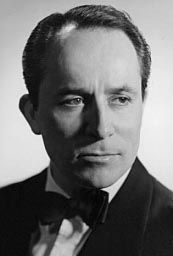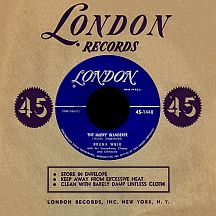FRANK WEIR
The Happy Wanderer
Spring! A great time to strap your knapsack on your back and head to the hills for plenty of fresh air and exercise, singing to the beat of your own two feet! And have I got the song for you...if it just so happens you're planning a joyous journey by foot near some scenic locale like, say, the Swiss Alps, all the better.
In 1949, Edith Möller assembled an amateur children's choir in the town of Obernkirchen in the German state of Lower Saxony; The Schoumburger Märchensänger ("Fairy Tale Singers") counted up to three dozen members, some of them orphaned, of varying ages between eight and 15. In 1953 the choir made a recording for the Odeon label of "Der Frohliche Wanderer," based on a poetic work dating back perhaps two hundred years; the record gave credit to Florenz Siegesmund, purported to have penned the original lyrics, as well as Edith and her brother, F.W. Möller. While popular in its native land, the German-language tune with its catchy 'Val-de-ri, val-de-ra' refrain really captured the imagination of the British record-buying public. Released on Parlophone and credited to The Obernkirchen Children's Choir (a name more easily identifiable to international listeners), it spent nearly the entire first half of 1954 on the U.K. charts, going as high as number two. Decca issued the recording in the U.S.; though it wasn't a strong seller, the choir traveled to New York and performed it on Ed Sullivan's CBS variety show Toast of the Town.
Edith translated the original lyrics as closely as possible into English ('Oh may I go a-wandering until the day I die...oh may I always laugh and sing beneath God's clear blue sky...val-de-ri, val-de-ra...val-de-ri, val-de-ra-ha-ha-ha-ha-ha-ha-ha-ha...') and several versions of "The Happy Wanderer" were recorded and rushed-released to radio. British saxophonist Frank Weir struck first on the London label in May '54, peaking in the U.S. top five the following month. Born in 1911, Weir had established himself as a soprano saxophonist during the 1930s in several London-based bands. Immediately after serving in the British Army during World War II, he made several 78s for the U.K. Decca label with his own band, The Astor Club Seven, named for their residency at West London's popular Astor Club. Although successful as a live performer, record sales left much to be desired until his "Wanderer" cover song became a major hit.

Yet Weir was not the only artist to make an impression with everyone's favorite new hiking song. Brit quartet The Stargazers connected on the April '54 U.K. charts, member Marie Benson's 'La-la-la-la-la' setting theirs apart from all other renditions. Back in the States, German-American bandleader Henri René and his Musette Orchestra hit big with a version on RCA Victor (crediting Antonia Ridge on the label as one of the song's composers) that featured a male group similar in sound to Weir's; it landed in the top ten in June. Singer Tommy Leonetti made a lesser showing with his pop production on Capitol shortly afterwards. Meanwhile, Deutschland production company Berolina was busy filming a romantic comedy in the state of Bavaria using the original title, Der Frohliche Wanderer, to capitalize on the original single's mass appeal. The movie played in German theaters in the fall of 1955.
Frank Weir made records for several more years. His orchestra backed Vera Lynn on "My Son, My Son," a number one hit in England in November '54. There was a version of composer Van Phillips' theme for the popular BBC science fiction radio series "Journey Into Space," a pair of similar "bird" songs, "The Cuckoo Cries" in '54 and "Mister Cuckoo (Sing Your Song)" in '56, and several other pop instrumentals for the Decca, Parlophone and Oriole labels. In the fall of 1960, the bouncy, somewhat dated "Caribbean Honeymoon" became a minor U.K. hit (the only one in his homeland, as "The Happy Wanderer" had been overshadowed there by the Obernkirchen disc). He tried something completely different in 1962 with the exotic, rocking "Manhunt," a Philips release credited to Frank Weir and his Werewolves.


